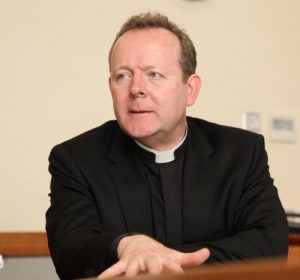
By Susan Gately - 04 May, 2018

Archbishop Eamon Martin, Catholic Archbishop of Armagh and Primate of All Ireland
A review of relationships and sexuality education in all schools, including Catholic schools, is essential if we are to help young people cope with the risks to their health and well-being presented in both the virtual and real worlds they inhabit, the Primate of All Ireland has said.
Addressing the annual conference of the Joint Managerial Body (JMB) and the Association of Management of Catholic Secondary Schools (AMCSS) yesterday, Archbishop Eamon Martin said relationships and sexuality education in Catholic schools was situated within “a morals and values framework that is derived ultimately from the life and teaching of Christ and transmitted through the teaching of the Catholic Church”.
Catholic schools should seek to promote a positive self-image and attitude to our bodies and an appreciation of the gift of sexuality, he told delegates meeting at the Galmont Hotel in Galway yesterday.
Referring to the recent debate on the Provision of Objective Sex Education Bill 2018, the Archbishop noted that “the approach of Catholic schools to Relationships and Sexuality Education was variously described by some as ‘backward’, ‘grossly distorted’, not ‘objective’, non ‘factual’, and even biologically incorrect. It was argued that relationships and sexuality education has to be ‘non-ethos based’,” he said.
These negative perceptions of the approach to relationships and sexuality education in our schools will sound unfair, harsh, uninformed and agenda-driven to many parents and to those who have been sensitively working in this area within our Catholic schools, he said. However, he agreed that a “review of relationships and sexuality education in all schools, including Catholic schools, is essential”.
The questions and challenges facing young people in living their lives today should not be ignored or skimmed over, he said. “A sound relationships and sexuality programme, developed in consultation with parents, will include age appropriate information, debate and discussion about contraception, sexually transmitted infections, same sex attraction and unions and the full meaning of consent – recent coverage of the Belfast trial and the international #MeToo movement also focuses minds on the issues of sexual violence and harassment.”
In choosing to send their children to a Catholic school, parents will want schools to help young people develop what Amoris Laetitia (AL) describes as a “critical sense in dealing with the onslaught of new ideas and suggestions, the flood of pornography and the overload of stimuli that can deform sexuality,” (AL 281), he said.
Relationships and Sexuality Education ought therefore to be an integral part of the curriculum in a Catholic school, the he continued. “It should present the positive, yet challenging Catholic vision for relationships, chastity, marriage and the family. This will include the Good News that: human life is sacred, that each human being comes from God, who created us, male and female; that we are willed by God who loves each and every one of us; that self-giving love and commitment in the marriage of a man and a woman open to life is not only possible, but is a beautiful and fulfilling gift with the power of God’s grace; that chastity is achievable, healthy and good for our young people; that the giving of oneself to another in marriage for life is special, rewarding and a wonderful symbol of Christ’s forgiving, faithful love for his Church.”
Catholic schools had to also “evaluate the support offered to students who are facing new and deep questions relating to their sexual identity as they mature,” he said. Bullying and ostracisation of LGBT pupils could not be tolerated “in any school, never mind a Catholic school which holds, as a core value, the dignity of every human person”.
The Archbishop called on the leaders and managers of Catholic schools to “look out for those who are being left behind” and to be “alert to potential inequalities in our educational system and to those young people – particularly the socially disadvantaged and those with greatest educational needs – who might leave without meaningful qualifications or opportunities, only to end up marginalised and forgotten by society.”